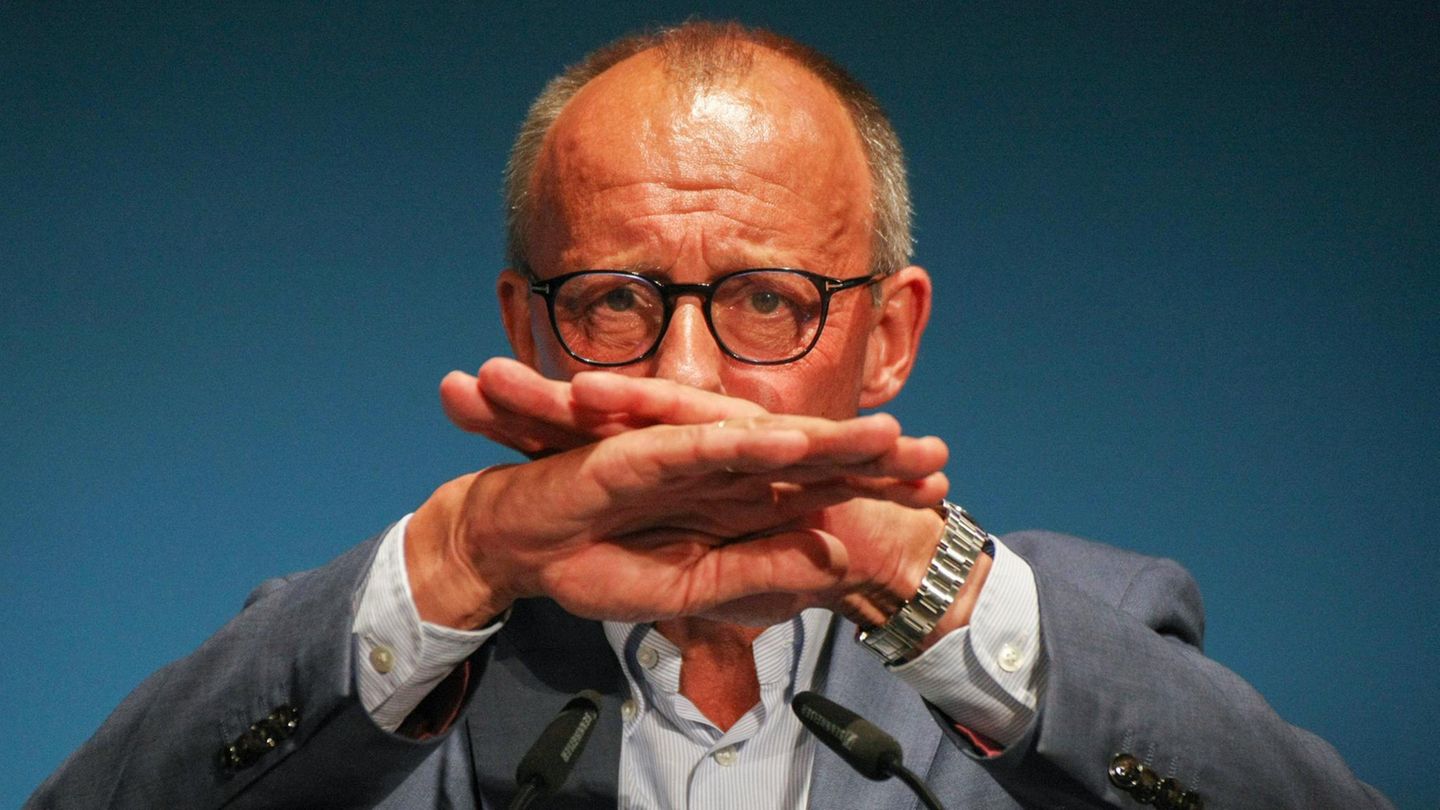Merz and the AfD
Why the Chancellor no longer wants to talk about the “firewall”.
Copy the current link
Add to wishlist
Friedrich Merz declares the AfD to be his main opponent. How exactly the CDU wants to go into battle is not clear. About an appearance that once again leaves room for speculation.
The sentences should sound as pithy as possible. And so were they. “This party avowedly wants to destroy the CDU,” said Friedrich Merz. The Chancellor and party chairman stood in Berlin’s Konrad-Adenauer-Haus on Monday morning – and once again talked about the AfD. “She wants another country,” he said. “The ‘outstretched hand’ that the AfD keeps trying to do is actually a hand that wants to destroy us.”
According to Merz, the AfD will therefore encounter “our toughest resistance”. And at the end of the press conference he reiterated: “We will not let these people destroy us.”
That all sounded pretty clear on its own. Nevertheless, the debate is unlikely to be over after the CDU chairman’s appearance. Quite the opposite. Not only did Merz avoid many questions. His answers, involuntarily or not, opened up new space for speculation.
CDU debated tactical opening to the AfD
On Sunday, the leadership of the CDU retreated to the retreat in Berlin’s Grunewald. In a nice hotel on the Havel, the aim was to reposition the party, especially in the direction of the AfD. They sat together for almost eight hours to talk about how to get through the next state elections as best as possible in order to stand stable in the decision-making year of 2029.
There was a lot of debate about what would amount to a tactical opening towards the AfD, especially internally, but also partly publicly. The demand of the former CDU general secretary Peter Tauber, who was considered liberal, attracted the most attention starNot to always swing the “Nazi club” but to allow parliamentary majorities on certain issues.
The excitement in the CDU, but also in the coalition partner SPD, had a huge effect. This had even happened in practice. After all, the CDU, out of opposition, passed joint resolutions with the AfD in the Thuringian state parliament in 2023 and also in the Bundestag last January.
Nevertheless, according to the executive committee, this demand played no role on Sunday. This is also because the CDU is now not only in power at the federal level, but also in Thuringia. There is currently no German parliament in which it has a joint majority with the AfD against a government.
“We now have a majority together with the SPD in the German Bundestag,” explained Merz when asked about it on Monday. “And that’s why this question doesn’t arise.” There is no aim for common majorities (“explicitly no”). The decision to demarcate the AfD and the Left applies (“We won’t change anything about it”). And anyone who says otherwise belongs to a minority (“few fringe figures”).
The idea of setting tough conditions for possible cooperation with the AfD in order to divide them internally was also reportedly not discussed at the Seehotel in Grunewald. Instead, there was agreement that the Union, which provides the Federal Chancellor, half of the Prime Ministers and the majority of local officials, must finally get off the defensive. The party now wants to go on the offensive. Motto: Us or them!
The burial of the “firewall” – as a concept
That’s why, and this is at least semi-new, the term “firewall” should be buried for good. Because it sounds like defense, not attack. So when Merz was asked about the term on Monday, he replied: “You may have noticed that neither the Secretary General nor I used the word firewall,” said Friedrich Merz on Monday morning.
And to make the message clearer, this Chancellor is once again bending reality beyond recognition. “That’s not our language,” he claims. “He wasn’t and he isn’t.”
As a reminder: Shortly before he was elected CDU chairman at the third attempt in 2022, he clearly stated the prospect: “With me there will be a firewall for the AfD.”
The new buzzword is “main opponent”
In doing so, he appropriated the term for himself, which will no longer be mentioned. The new buzzword for Merz is “main opponent”. This term, he said, had already worked in the federal election campaign in the debate with the Greens. “And I can only advise everyone to take it seriously,” he added. “If we designate someone as the main opponent, then we are really fighting them.”
Apart from the fact that he is equating the Greens with the AfD, at least on a strategic level: How is the new offensive strategy supposed to work? The fact that the CDU wants to “provide content” for the AfD is not new, no matter how much Merz tries to create exactly this impression.
If you ask around in the CDU, then the exam is actually supposed to be the start of what may be the final battle against the AfD. This includes: naming their extremism and, if necessary, scandalizing them. Continue to focus on AfD topics such as migration or patriotism. And above all: always attack, never retreat.
The rest is hope for a recovery in the economy, an end to the wars and a better mood as a result, ideally in the coming state election year.
Friedrich Merz leaves room for interpretation
But what if that doesn’t work – and instead the AfD dilemma only gets bigger in 2026? What if, for example, in Saxony-Anhalt there is no longer any majority against the AfD or – perhaps even more unpleasant for the Union – only a majority with the help of the Left?
When Merz was asked this question, he not only said that the CDU want to win all state elections and have the government mandate. But he also says: “And then we decide how such a government comes into being.” Because: “We will answer the question of what if the day after the elections and not before.”
In peacetime, these would be standard sentences, as party leaders like to say. But in times of renewed struggle they sound: at least capable of interpretation.
Source: Stern
I have been working in the news industry for over 6 years, first as a reporter and now as an editor. I have covered politics extensively, and my work has appeared in major newspapers and online news outlets around the world. In addition to my writing, I also contribute regularly to 24 Hours World.






